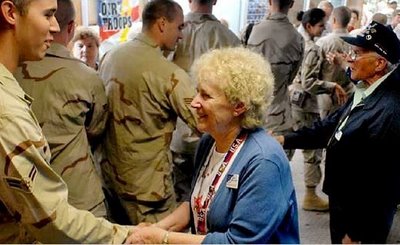Saying Thank You to Those Who Answered the Call of Duty

Marguerite Eckert and Sid Buzzell, volunteers with Maine Troop Greeters, met a military flight at Bangor International Airport last week.
BANGOR, Me. — Shortly before 11 on a recent Monday night, Cathy Czarnecki made sure the macadamia nut cookies were on the table of treats in a room at Bangor International Airport. The commercial passengers had all left, but 260 soldiers would soon arrive to a welcome that few of them expected.
“Here they come!” someone shouted, and a dozen or so volunteers went out into the hallway and applauded as a line of soldiers in desert camouflage and tan boots poured into the small terminal.
“Thank you for your service,” one man said to a soldier while shaking his hand. “Welcome to Maine,” another greeter said.
“I think I’m going to cry,” a female soldier said after being hugged and cheered in the terminal.
The volunteers are members of Maine Troop Greeters, which was founded in 1991 to greet troops headed to the Persian Gulf war. Since May 2003, shortly after the start of the Iraq war, the group has welcomed every military transport flight that has arrived here.
The group came about, in part, because this is the country’s easternmost airport and it has one of the longest runways in the nation, making it a favored military refueling and transfer location.
The founder of the group, Bill Knight, 84, is a World War II veteran. He recalled how soldiers were treated after Vietnam and said he wanted to ensure that troops were thanked.
“The way they treated those troops was horrible,” Mr. Knight said. “We can’t go back, but we can try to make a difference from here on out.”
Maine Troop Greeters has about 100 volunteers who operate out of the small room, which is lined with American flags, signed military T-shirts and maps of Iraq. They arrive about three hours before a flight to set out cookies donated by a local Sam’s Club, pies baked by volunteers, and candy and donuts. They also make sure free cellphones donated by local providers are available for troops to use.
Read the rest at the NY Times

<< Home